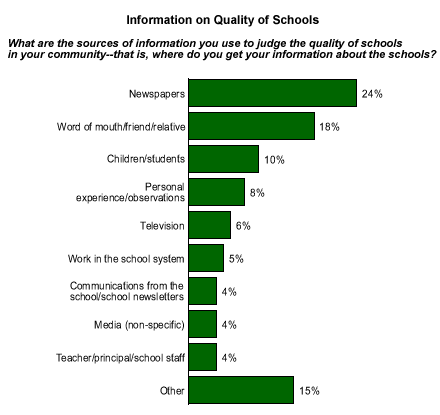For years, Gallup has asked Americans what they think is the "most important problem facing the country today." Education has held a consistent place on the list in the last decade, at times, such as in March and October 2000, receiving more responses than any other issue.
People are intensely -- and perpetually -- interested in school quality, particularly the quality of their local schools. But although schools have a vested interest in distributing information about themselves, Gallup data show that schools themselves are not the most frequent place Americans to for information about the quality of education in their area.
Where'd You Hear That?
The 2002 Phi Delta Kappa/Gallup survey on the public schools* asked Americans the open-ended question, "What are the sources of information you use to judge the quality of schools in your community?" Results indicate that the public obtains information from a wide variety of sources. Newspapers are by far the most popular, named by 24% of Americans. With regard to electronic media, 6% say they get school information from television, and only 1% say the Internet. Another 4% give the non-specific answer of "media."
After the newspaper, another popular source of information is the grapevine. Eighteen percent of respondents say they hear about school quality via "word of mouth," "friends," or "relatives." Ten percent get their information from students/children.

Taking Quiet Time Too Far
Fewer people rely on the schools themselves as a source of school information compared to the newspapers and the media more generally. Roughly one in four get information from the schools, through a variety of ways.
When asked where they get information on quality of schools, 3% of respondents gave the general answer of "from the school." Five percent answered that they "work in the school system." A combined 5% answered with either "communications from the schools" or newsletters. A slightly smaller 4% get the information they use to judge school quality from teachers, principals, or school staff. Another 5% combined to say they rely on the board of education, school meetings/conferences, the PTA or PTO, or test scores/grades. Eight percent say more vaguely that they rely on personal experience or observations.
Missed Opportunities?
School systems have an enormous stake in public perceptions of their quality. As the experts on education, school systems also know more about kids, teaching, curriculum, administration -- all the things that go into a quality education -- than anybody else.
So why don't more people turn to the schools themselves for information? Perhaps the public doubts that the educational system will be objective about itself. More likely it's because public school systems don't see the need to expend scarce resources disseminating information to the broader community.
But that may represent a missed opportunity as education reform picks up steam with the implementation of the No Child Left Behind Act. Allowing media sources, even traditionally reliable ones such as newspapers, to tell their story could undermine the educational system's credibility if the facts are reported incorrectly. And hoping that the public will attend a school board meeting before rushing to judgment on an issue is, perhaps, too idealistic.The public demands information because it demands quality schools. It may be in a school system's best interest to fulfill the first demand (through press releases, parent conferences, more extensive use of newsletters, etc.) before the public begins to doubt the potential of the second.
*The findings from the 2002 Phi Delta Kappa/Gallup poll are based on telephone interviews with a randomly selected national sample of 1,000 adults, aged 18 and older, conducted June 5-26, 2002. For results based on this sample, one can say with 95% confidence that the maximum error attributable to sampling and other random effects is ±3%.